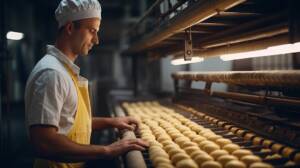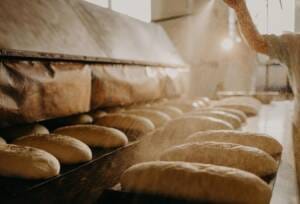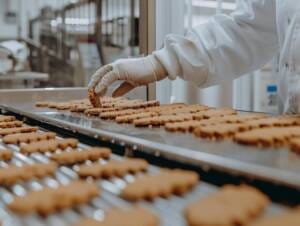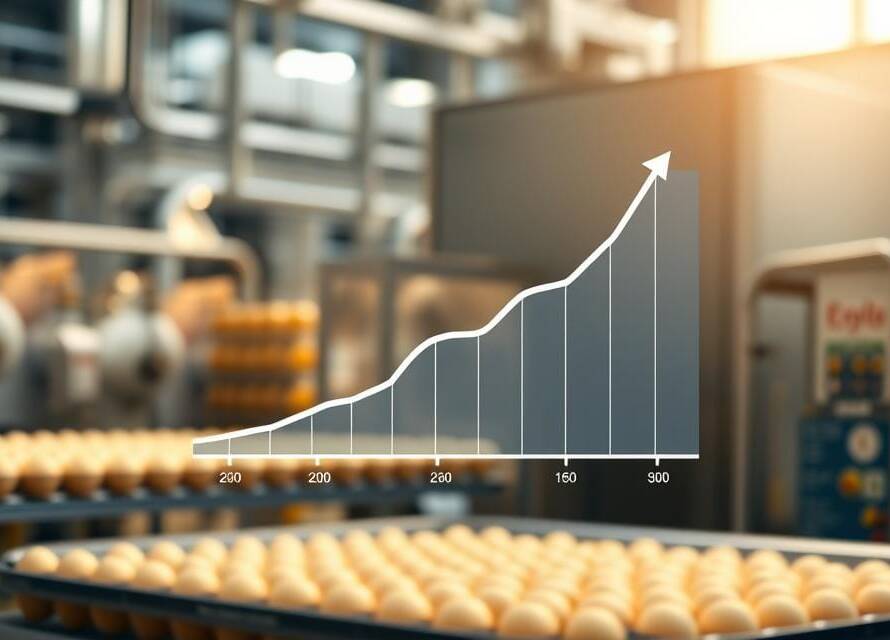
The bakery industry is one of the oldest food industries that has always been an essential part of the daily human diet. Establishing a bakery factory requires an in-depth study of the various factors that affect this industry, from choosing the right equipment to adhering to health standards.
In this article, we will take a comprehensive look at everything related to this industry and how to establishing a bakery factory in this field.
Steps to establishing a bakery factory
1-Feasibility study
The first step when establishing a bakery factory is to prepare a comprehensive feasibility study. This study includes analyzing the target market, determining the type of baked goods that will be produced, and estimating the total cost of the project. This analysis helps you determine whether the project is financially feasible or not.
2-Selecting the location
The location of the factory must be carefully selected so that it is close to sources of raw materials and ease of distribution. It is preferable for the factory to be in an industrial area close to the target markets, in addition to having sufficient space to accommodate equipment and storage areas.
3-Designing production lines
Designing production lines is a crucial element in establishing a bakery factory. Equipment must be selected that is appropriate for the type of baked goods to be produced, whether sweet or savory. Necessary equipment includes mixers, ovens, cutting machines, and packaging lines. These machines must be highly efficient to meet demand and ensure product quality.
4-Obtaining the necessary licenses
When establishing a bakery factory, the necessary licenses must be obtained from government agencies. This includes health and safety licenses and environmental permits. These licenses ensure that the factory adheres to the required health and environmental standards, which contributes to protecting consumers and ensuring the safety of products.
Choosing Raw Materials Used in Bakery Industry
Choosing Flour
Flour is the main ingredient in most types of baked goods. The type of flour used depends on the type of baked goods to be produced. For example, wheat flour is used in making bread, while cake flour is preferred for sweet baked goods. Care must be taken to choose reliable suppliers to ensure the quality of the flour.
Additional Materials
In addition to flour, the bakery industry requires the use of a variety of additives such as yeast, sugar, salt, and butter. These materials must be of high quality to ensure the production of baked goods with a distinctive taste and ideal texture.
Quality and Safety Standards When Establishing a Bakery Factory
Adherence to Health and Safety Standards
When establishing a bakery factory, strict health standards must be adhered to to ensure consumer safety. This requires constant monitoring of temperatures at all stages of production, in addition to ensuring the cleanliness of the equipment and machines used. Workers must also be trained to follow health and safety guidelines on an ongoing basis.
Quality Control
Quality control is an integral part of establishing a bakery factory. This process includes periodically inspecting products to ensure they conform to specifications. Detailed records should also be kept for each batch produced to ensure that any problems that may occur can be easily tracked.
Challenges to be faced when establishing a bakery factory
Technical challenges
The bakery industry faces technical challenges related to developing new products and improving the efficiency of production lines. The success of the factory depends on its ability to continuously innovate and meet changing market needs.
Environmental challenges
Waste generated by the bakery industry is one of the environmental challenges that must be dealt with carefully. This requires strict waste management procedures and recycling of reusable materials to reduce the environmental impact.
Developing new bakery products
Innovation in the bakery industry
As consumer preferences evolve, the bakery industry has become in need of continuous innovation. Healthy products containing natural ingredients or gluten-free baked goods can be developed to meet the needs of a specific category of consumers. Product innovation is what distinguishes one factory from another in a competitive market.
Testing and development
To develop new products, multiple tests must be conducted to ensure the quality of the product and its acceptance by consumers. This requires a specialized research and development team to experiment with new ingredients and improve production techniques.
The Importance of Using Technology When Establishing a Bakery Factory
Automation of Production Lines
One of the most important developments in the bakery industry is the automation of production lines. Technology can reduce operating costs and improve production efficiency. Automation also helps reduce human errors and improve production accuracy.
Remote Monitoring
Factories can now monitor production processes remotely using advanced systems that allow tracking of all processes through smartphone applications. These systems help improve factory management and reduce downtime.
The Importance of Sustainability When Establishing a Bakery Factory
1-Reducing Waste in Production
One of the essential elements in the modern bakery industry is reducing waste resulting from production. This can be achieved by improving resource management and recycling organic waste, such as unused dough residues. The factory must be equipped with advanced systems to monitor the consumption of raw materials and ensure their optimal use.
2-Using Renewable Energy
To achieve greater environmental sustainability, bakery factories can move towards using renewable energy sources such as solar or wind energy. This step helps reduce energy costs and reduce the environmental impact of the factory, making it more compatible with modern environmental requirements.
Refrigeration and Storage Technology
Advanced Storage Systems
Baked goods require special storage conditions to maintain their quality. The use of advanced refrigeration and storage systems contributes to extending the shelf life of products and ensuring their delivery to markets with high quality. Therefore, when establishing a bakery factory, warehouses must be equipped with temperature and humidity control devices to prevent spoilage and maintain the freshness of baked goods.
Transportation and Distribution
The process of transporting baked goods from the factory to local or global markets is an important part of the production chain. Delicate baked goods require a tight transportation system while ensuring that the appropriate temperature is maintained to maintain their quality. Factories must rely on advanced packaging technologies that protect products during the transportation process and ensure that they arrive in perfect condition.
Examples of bakery products that can be produced
Traditional bread and innovative bread
Breads are among the most common products that can be produced in a bakery. This includes traditional white bread, whole wheat bread, and French bread (baguette). In addition to traditional bread, the factory can offer innovative products such as high-protein bread or gluten-free bread to meet the needs of specific consumer groups looking for healthy options.
Cake and pastry
A bakery can specialize in producing a wide range of cakes and pastries, such as sponge cakes, cupcakes, and tarts. Pastries such as croissants, Danishes, and puff pastries are among the popular products that are very popular. The variety of pastries and cakes gives the factory the opportunity to offer a variety of flavors and use innovative ingredients.
Savoury baked goods
In addition to sweets, a bakery can produce a range of savoury baked goods such as pies, bagels, pretzels, and pastries filled with cheese or meat. These products are an excellent choice for markets that require ready-to-eat and easy-to-prepare foods for daily consumption.
Health-Specific Products
With the increasing demand for healthy products, a bakery can move towards producing specialty baked goods such as oat bread, whole grain baked goods, and high-fiber products. Low-calorie or non-artificial baked goods can also be offered to meet the demands of consumers who prefer a healthy lifestyle
In conclusion, establishing a bakery factory is a project that requires careful planning and significant financial investments. It is essential to consider all factors from location selection to product innovation to ensure success in this field. ProNano Food Industry Consulting Company provides specialized consultations in this field, and helps those interested in establishing successful and efficient bakery factories, with a focus on improving quality and increasing productivity. Do not hesitate to contact ProNano Company to benefit from their specialized expertise.
Read more about Halal Food Consulting



